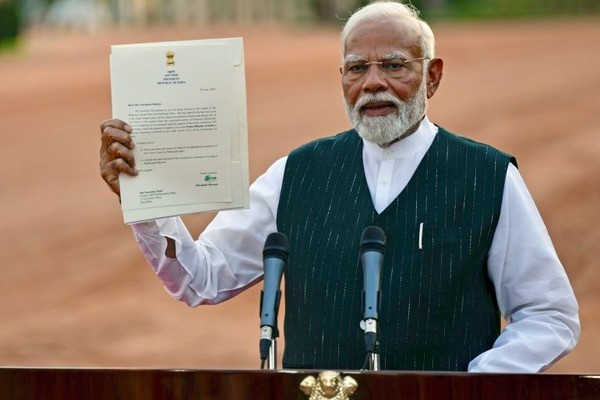Iran’s Plan to Strike Back Against the U.S.
Iran’s Military Preparations Following U.S. Attacks
Loading...

As Modi readies for his swearing-in ceremony amidst a diminished mandate, analysts and critics suggest that the allies he relies on might act as a counterbalance to his government.
In New Delhi, India, Vishal Paliwal, a 57-year-old worker of Prime Minister Narendra Modi’s Bharatiya Janata Party (BJP), spent Tuesday afternoon resting at home as India tallied over 640 million votes in its national election.
Paliwal, a granite stone trader in the northwestern state of Rajasthan, had lost his livelihood due to Modi's sudden lockdown during the COVID-19 pandemic. Despite this, he remained loyal to the BJP. However, in the recent elections, he couldn't bring himself to vote for either the BJP or the opposition.
Yet, something had changed for him. “I couldn't bring myself to vote for the BJP either,” said Paliwal.
By the time Paliwal woke up, the nation had witnessed a significant shift. The BJP had lost its majority, a surprising outcome contrary to exit polls, securing 240 seats in the 543-member Lok Sabha – India’s lower house of parliament – down from the 303 it won in 2019. Though it still poised to form the next government with regional partners under its National Democratic Alliance (NDA), Paliwal believed the drop in the party’s numbers was a necessary correction for the nation.
“I was delighted to see the results,” said Paliwal. “People have chosen an opposition, not a government, by voting this time. We really needed this.”
As Modi prepares for his third term in office, his reduced mandate could significantly influence India’s next government, analysts suggest. The Telugu Desam Party (TDP) and the Janata Dal (United), two major allies Modi relies on, are said to have made stringent demands of the BJP – from prominent positions in the Cabinet to a common governance program.
The BJP remains optimistic about its third term. “These fears are baseless,” stated Zafar Islam, BJP national spokesperson. “Everyone in NDA has faith in PM Modi’s leadership. There is no disconnect between our partners.”
However, both the TDP and the JD(U) claim to be secular parties, counting Muslim voters among their support base. Given BJP's Hindu majoritarian politics and accusations of overlooking hate crimes, rising unemployment, inflation, and inequality, these allies could serve as a check on Modi's government, according to analysts and activists.
“Indian voters have ensured that Modi will not function as a dictator,” remarked rights activist Harsh Mander. “There is no evidence he consulted with his cabinet before major decisions. Hopefully, that’s over now.”
Afreen Fatima, a 26-year-old Muslim activist, expressed her dissatisfaction with BJP’s campaign filled with anti-Muslim rhetoric. Despite the BJP’s losses in her parliamentary district and surrounding areas, she remains cautious. “I’m not sure if it was a vote against hate,” she said. “With a lack of alternatives, we vote for the lesser evil to defeat the bigger monster.”
Fatima also noted the declining representation of Muslims in Indian politics and the surge in hate speech, particularly in states governed by the BJP.
Critics accuse Modi of targeting not only Muslims but also opposition figures. Investigative agencies raided premises linked to rights activist Harsh Mander, and opposition leaders have faced legal actions. Despite these challenges, Mander reaffirmed his faith in Indian democracy, buoyed by the election results.
Modi’s return to power presents a dilemma for the US and Western countries, balancing strategic engagement with India against its shift towards illiberalism. According to Michael Kugelman, director of the Wilson Center’s South Asia Institute, the election outcome humbled the BJP and Modi, signaling a renewed strength in the opposition and potential compromises in governance.
As Modi and the BJP move towards forming India’s next government, uncertainties lie ahead. Political strategist Dilip Cherian emphasized that the exit from power defines the lasting image, hinting at potential challenges for Modi and his deputy Amit Shah.
“There is a hope that we are getting our country back,” said Mander. However, he cautioned against viewing the election as a cure-all for India’s deepening social tensions.
Iran’s Military Preparations Following U.S. Attacks
Troops remain in five strategic locations, raising fears of renewed tensions and long-term occupation.
Opposition forces have taken control of the capital after a significant offensive. Here is how it unravelled.
